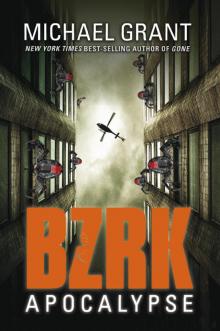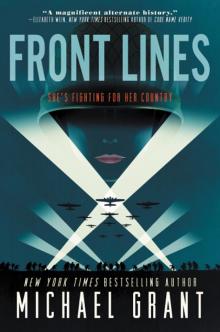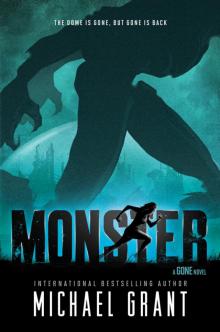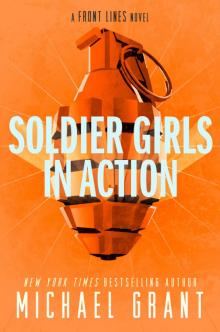- Home
- Michael Grant
Soldier Girls in Action Page 3
Soldier Girls in Action Read online
Page 3
Both Rio and Jenou wear their uniform trousers rolled up to above the knee, and sleeveless olive drab T-shirts. Cat Preeling, fifty feet away and playing a game of horseshoes with Tilo Suarez, is the only female GI with the nerve to strip down to bra and boxers. She’s a beefy girl with a cigarette hanging from her downturned mouth. Tilo, like many of the off-duty men, wears only his boxers and boots, showing off a taut, olive-complected body that Jenou would be watching much more closely if only Tilo were six inches taller.
The bra and boxers look is a bit too daring for Rio and Jenou, but Cat seems to have a way of deflecting unwanted male attention, like she’s wearing a sign that reads: Don’t bother. Even the ever-amorous Tilo is content to toss horseshoes with her, though the shoes in question are actually brass rings roughly cut from discarded 155 brass and the peg is a bayonet.
Rio and Jenou both have brown-tanned faces, necks, and forearms, but the rest of them blazes a lurid white with just a tinge of pink where the skin is beginning to burn.
“What was what like?” Rio repeats the question slowly. She has a wet sock laid over her eyes to afford some shade. There is a half-empty bottle of Coca-Cola beside her. It was almost cold once and now is the temperature of hot tea. Jenou has a book held up to block the sun, The Heart Is a Lonely Hunter, in a paperback edition.
It is the summer of 1943 in Tunisia, and it is hot. Desert hot. Completely immobile—except when they swat at a fly—both young women are still sweating.
“You know,” Jenou insists. “The first time. I’m just trying to get an idea.”
“What are you, writing a book?” Rio says sharply. “Suddenly you’re reading books and now you’re trying to plumb the depths of my soul?”
“My usual appetite for fashion and Hollywood gossip isn’t being satisfied,” Jenou says, adopting a light, bantering lilt before restating her question in a more serious tone.
Rio sighs. “I don’t know, Jen.” She pronounces the name with a soft j, like zh. Jenou’s name is inspired by the word ingenue, a perfectly inappropriate reference point for Jenou, who is far from being the innocent the name suggests.
Jenou is blond, with hair cut short to just below the ear. General Patton has decreed that all female soldiers will have hair cut to above the bottom of their earlobe. The general is improvising—army regulations have not quite caught up with the realities of female soldiers. In addition to being blond, Jenou is quite pretty, just shy of beautiful, and has a pinup’s body.
Jenou remains silent, knowing the pressure will build on Rio to say something. And of course she’s right.
“It was . . .” Rio searches for a word picture, a metaphor, something that will convey enough meaning that Jenou will not feel the need to ask anymore. Thinking about it takes her back to that moment. To the sound of Sergeant Cole’s voice yelling, Shoot!
Richlin! Suarez! Lay down some fugging fire!
Rio remembers it in detail. It had been as cold then as it is hot now. Her breathing had become irregular: a panicky burst followed by a leaden thud-thud-thud.
She remembers lining up the sights of her M1 Garand. She remembers the Italian soldier. And the pressure of her finger on the trigger. And the way she slowed her breathing, the way she shut out everything, every extraneous sound, every irrelevant emotion. The way she saw the target, a man in a tan uniform lined up perfectly on the sights.
The way her lungs and heart seemed to freeze along with time itself.
The moment when her right index finger applied the necessary seven-point-five pounds of pressure and the stock kicked back against her shoulder.
Bang.
The way she had first thought that he had just tripped. The way the Italian had seemed to be frozen in time, on his knees, maybe just tripped, maybe just caught his toe on a rock and . . . And then the way the man fell back.
Dead.
“Like it wasn’t me,” Rio says at last. “Like someone else was moving me. Like I was a puppet, Jen. Like I was a puppet.”
This is the third time, not the first, that Jenou has asked about that first killing. Rio is vaguely aware that it has become important to Jenou that Rio remain Rio. She understands that Jenou does not have the sort of home you get sentimental over, and that as a result Rio is home to Jenou. Sometimes she intercepts a look from Jenou, a passing betrayal of inner doubts. Jenou, who Rio would never have thought capable of any sort of reflection, has developed a sidelong, contemplative gaze. A judging gaze tinged with worry. And sometimes Rio looks for ways to reassure Jenou, but at this particular moment it is just too damned hot.
“Doing my job,” Rio says with a hint of wry humor. “Rio Richlin, Private, US Army, sir! Shootin’ Krauts, sir!” She executes a lazy salute.
A truck rattles by, and a dozen male GIs whistle and yell encouragement along the lines of “Hey, sweetheart!” and “Oh baby!” and “Bring those tatas here to papa!”
Rio and Jenou ignore the catcalls as just another bit of background noise, like the coughing engine of a Sherman tank lurching toward the motor pool, or the insect buzz of the army spotter plane overhead.
“Hey, I got a letter from Strand,” Rio says, wanting to change the subject and dispel her own lingering resentment.
A dozen soldiers, mostly men, march wearily past, coming in from a patrol. “Which of you broads want me between your legs?”
Jenou raises a middle finger without bothering to look and hears a chorus of shouts and laughs, some angry, most amused.
“Well, dish, sweetie. How is tall, dark, and handsome doing?” Jenou asks.
“He says he’s fine. And he’s looking for a way to get here.”
“From Algiers? Kind of a long walk.”
“I think he was hoping for a train. Or a truck. Or a plane.”
“He’d fly his own plane over here if he really loved you.”
Does he? Does he still? Am I still the girl he fell for?
Rio reaches blindly to give Jenou a shove. “I don’t think the army just lets you borrow a B-17 whenever you want one.”
“He could offer to pay for the gas.”
“Let’s roll over. This side’s parboiled.”
They roll over, Rio recoiling as bare flesh touches the metal skin of the vehicle.
Suddenly a siren begins its windup and both girls sit up fast, shield their eyes, and scan the horizon.
“Aw, hell,” Jenou says, pointing at two black dots rushing toward them from the direction of the sea.
The cry goes up from a dozen voices. “Plane! Plane! Take cover!”
They climb down quickly—much more quickly than they climbed up.
“Under the track?” Rio wonders aloud, looking toward the nearest ditch, which is already filling up with scrambling GIs.
“The Kraut will aim for the track!” Jenou yells.
“He’ll see it’s one of his own and burned out besides,” Rio counters in a calmer tone. They crawl madly for the shelter of all that steel and lie facedown, breathing dust, almost grateful for the shade. Antiaircraft guns at the four corners of the camp open up, firing tracer rounds at the dots, which have now assumed the shape of Me 109 fighters with single bomb racks.
Bap-bap-bap-bap-bap! The antiaircraft guns blaze, joined by small arms fire from various soldiers firing futilely with rifles and Thompsons.
The Messerschmitts come in fast and low, and starbursts twinkle on their wings and cowling. Machine gun bullets and cannon shells rip lines across the road and into the tents. A voice yells, “Goddamn Kraut shot my goddamn coffee!”
The planes release one bomb each, one a dud that plows into the dirt between two tents and sticks up like a fireplug, smoking a little. The second bomb is not a dud.
Ka-BOOM!
The front end of a deuce-and-a-half truck, clear at the far end of the camp, explodes upward, rises clear off the ground on a jet of flame before falling to earth, a smoking steel skeleton. The engine block, knocked free by the power of the bomb, twirls through the air, rising twenty feet bef
ore falling like an anvil out of a Bugs Bunny cartoon as GIs scurry out of the way. Rio does not see where it lands.
The planes take a tight turn and come roaring back overhead, machine guns stitching the ground like some mad sewing machine.
And then they head off, unscathed, racing away to the relative safety of their base in Sicily.
Rio and Jenou crawl out from beneath the half-track and gaze, disgusted, at the caked-on dirt that covers their fronts from toes to knees to face.
“They could have waited till we toweled off,” Jenou says.
“We best go tell Sarge we’re still alive,” Rio says.
The air raids are fewer lately, as the Royal Air Force planes with some help from the Americans have claimed control of the North African skies. But now Rio hears a distant shriek of pain and thinks what every soldier thinks: Thank God it isn’t me, followed by, At least some poor bastard is going home.
A term has become common: million-dollar wound. The million-dollar wound is the one that doesn’t kill or completely cripple you but is enough to send you home to cold beer and cool sheets and hot showers.
A team of medics, three of them, rush past, with only one taking the time to turn and run backward while yelling, “I have some training in gynecology; I am happy to do an examination!” as he grabs his crotch.
He trips and falls on his back, and Rio and Jenou share a satisfied nod.
The US Army, Tunisia, in the summer of 1943.
BACK ADS
DISCOVER
your next favorite read
MEET
new authors to love
WIN
free books
SHARE
infographics, playlists, quizzes, and more
WATCH
the latest videos
TUNE IN
to Tea Time with Team Epic Reads
ABOUT THE AUTHOR
MICHAEL GRANT has spent much of his life on the move. Raised in a military family, he attended ten schools in five states, as well as three schools in France. Even as an adult he kept moving, and in fact he became a writer in part because it was one of the few jobs that wouldn’t tie him down. His fondest dream is to spend a year circumnavigating the globe and visiting every continent. Yes, even Antarctica. He lives in California with his wife, Katherine Applegate, and their two children. You can visit him online at www.themichaelgrant.com.
Discover great authors, exclusive offers, and more at hc.com.
BOOKS BY MICHAEL GRANT
Gone
Hunger
Lies
Plague
Fear
Light
Messenger of Fear
The Tattooed Heart
The Snake
Front Lines
Silver Stars
Soldier Girls in Action
COPYRIGHT
Katherine Tegen Books is an imprint of HarperCollins Publishers.
Text copyright © 2017 by Michael Grant
SOLDIER GIRLS IN ACTION. All rights reserved under International and Pan-American Copyright Conventions. By payment of the required fees, you have been granted the nonexclusive, nontransferable right to access and read the text of this e-book on-screen. No part of this text may be reproduced, transmitted, downloaded, decompiled, reverse-engineered, or stored in or introduced into any information storage and retrieval system, in any form or by any means, whether electronic or mechanical, now known or hereafter invented, without the express written permission of HarperCollins e-books.
EPub Edition © 2017
ISBN 978-0-06-234224-9
EPub Edition © January 2017 ISBN 9780062342249
10 9 8 7 6 5 4 3 2 1
FIRST EDITION
ABOUT THE PUBLISHER
Australia
HarperCollins Publishers Australia Pty. Ltd.
Level 13, 201 Elizabeth Street
Sydney, NSW 2000, Australia
www.harpercollins.com.au
Canada
HarperCollins Canada
2 Bloor Street East - 20th Floor
Toronto, ON M4W 1A8, Canada
www.harpercollins.ca
New Zealand
HarperCollins Publishers New Zealand
Unit D1, 63 Apollo Drive
Rosedale 0632
Auckland, New Zealand
www.harpercollins.co.nz
United Kingdom
HarperCollins Publishers Ltd.
1 London Bridge Street
London SE1 9GF, UK
www.harpercollins.co.uk
United States
HarperCollins Publishers Inc.
195 Broadway
New York, NY 10007
www.harpercollins.com

 Fear
Fear Plague
Plague BZRK: Apocalypse
BZRK: Apocalypse Bzrk
Bzrk Love Sucks and Then You Die
Love Sucks and Then You Die Silver Stars
Silver Stars The Key
The Key Front Lines
Front Lines BZRK Origins
BZRK Origins Monster
Monster Gone
Gone The Snake
The Snake The Power
The Power Hunger
Hunger Lies
Lies A Sudden Death in Cyprus
A Sudden Death in Cyprus Messenger of Fear
Messenger of Fear Eve & Adam
Eve & Adam The Trap
The Trap Light
Light An Artful Assassin in Amsterdam
An Artful Assassin in Amsterdam The Call
The Call Hero
Hero Soldier Girls in Action
Soldier Girls in Action Purple Hearts
Purple Hearts The Tattooed Heart
The Tattooed Heart The Fall of the Roman Empire
The Fall of the Roman Empire BZRK Reloaded
BZRK Reloaded Messenger of Fear Novella #1
Messenger of Fear Novella #1 The Magnificent 12
The Magnificent 12 Fear: A Gone Novel
Fear: A Gone Novel Villain
Villain Manhattan
Manhattan Eve and Adam
Eve and Adam Plague: A Gone Novel
Plague: A Gone Novel Fergie Rises
Fergie Rises In the Time of Famine
In the Time of Famine Hunger_A Gone Novel
Hunger_A Gone Novel Lies g-3
Lies g-3